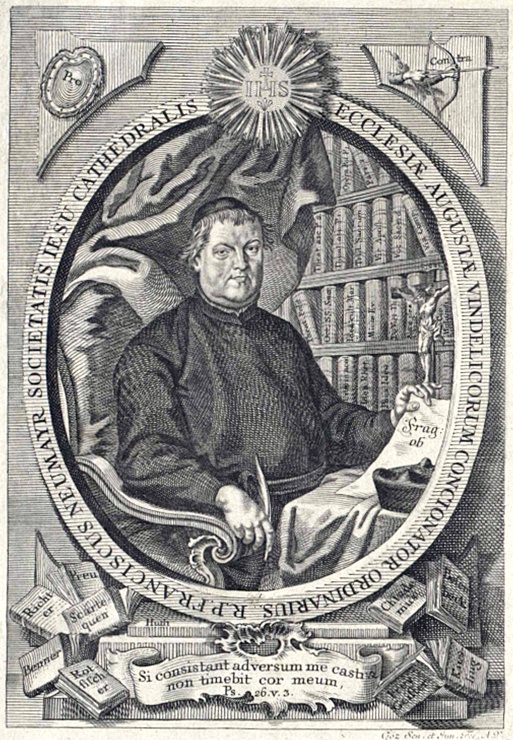Franz Neumayr on:
[Wikipedia]
[Google]
[Amazon]
 Franz Neumayr (17 January 1697 – 1 May 1765) was a German
Franz Neumayr (17 January 1697 – 1 May 1765) was a German
 Franz Neumayr (17 January 1697 – 1 May 1765) was a German
Franz Neumayr (17 January 1697 – 1 May 1765) was a German Jesuit
, image = Ihs-logo.svg
, image_size = 175px
, caption = ChristogramOfficial seal of the Jesuits
, abbreviation = SJ
, nickname = Jesuits
, formation =
, founders ...
preacher, writer on theological, controversial and ascetical
Asceticism (; from the el, ἄσκησις, áskesis, exercise', 'training) is a lifestyle characterized by abstinence from sensual pleasures, often for the purpose of pursuing spiritual goals. Ascetics may withdraw from the world for their p ...
subjects, and author of many Latin dramas on sacred themes.
Life
He was born atMunich
Munich ( ; german: München ; bar, Minga ) is the capital and most populous city of the States of Germany, German state of Bavaria. With a population of 1,558,395 inhabitants as of 31 July 2020, it is the List of cities in Germany by popu ...
, entered the Society of Jesus 3 October 1712, and after his studies in the Society, taught rhetoric and ''belles lettres
is a category of writing, originally meaning beautiful or fine writing. In the modern narrow sense, it is a label for literary works that do not fall into the major categories such as fiction, poetry, or drama. The phrase is sometimes used pejora ...
'' for ten years. He then for two years preached on the missions, and he was made director of the Latin sodality at Munich, a post which he filled for eleven years.
From 1752 to 1763 he preached at Augsburg Cathedral
The Cathedral of Augsburg (German: ''Dom Mariä Heimsuchung'') is a Roman Catholic church in Augsburg, Bavaria, Germany, founded in the 11th century in Romanesque style, but with 14th-century Gothic additions. Together with the Basilica of St. U ...
. His controversial sermons were directed in a great part against the Lutheran
Lutheranism is one of the largest branches of Protestantism, identifying primarily with the theology of Martin Luther, the 16th-century German monk and reformer whose efforts to reform the theology and practice of the Catholic Church launched th ...
s, and in particular against the apostate monk :de:Franz Ignatius Rothfischer, and Chladonium. He died at Augsburg
Augsburg (; bar , Augschburg , links=https://en.wikipedia.org/wiki/Swabian_German , label=Swabian German, , ) is a city in Swabia, Bavaria, Germany, around west of Bavarian capital Munich. It is a university town and regional seat of the ' ...
.
Works
His works, as enumerated inSommervogel
Carlos Sommervogel (8 January 1834 – 4 March 1902) was a French Jesuit scholar. He was author of the monumental ''Bibliothèque de la Compagnie de Jésus'', which served as one of the major references for the editors of the Catholic Encyclope ...
, number 112 books and pamphlets. They include: Latin plays for the use of his Latin sodality, which periodically staged such productions for the pleasure and edification of the literary men of Munich; sermons which he had delivered in the pulpit of Augsburg cathedral; works on asceticism
Asceticism (; from the el, ἄσκησις, áskesis, exercise', 'training) is a lifestyle characterized by abstinence from sensual pleasures, often for the purpose of pursuing spiritual goals. Ascetics may withdraw from the world for their p ...
; treatises on rhetoric and poetry; and some essays on moral theology
Ethics involves systematizing, defending, and recommending concepts of right and wrong behavior.''Internet Encyclopedia of Philosophy''"Ethics"/ref> A central aspect of ethics is "the good life", the life worth living or life that is simply sati ...
in defence of the Jesuit system.
Some of his Latin plays were republished in his two collections, "Theatrum Asceticum" and "Theatrum Politicum". "Theatrum Asceticum, sive Meditationes Sacrae in Theatro Congregationis Latinae de B. V. Mariae, ab Angelo Salutatae exhibitae Monachi verno jejunii tempore ab anno 1739 usque ad annum 1747" (871 pp., Ingolstadt and Augsburg, 1747, 5 editions) contains dramatic renderings of such subjects as the conversion of St. Augustine, devotion to the Blessed Virgin Mary, the evil of sin, the fear of God, Divine Mercy and Love. "Theatrum Politicum sive Tragoediae ad commendationem Virtutis et Vitiorum detestationem, etc." (Augshurg and Ingolstadt, 1760, 518 pp.) contains episodes from the lives of Eutropius, Papinianus, Anastasius, Dicorus, Tobias, and Sara, etc. These plays, besides numerous others were published also in separate booklets.
On his ascetical writings probably the most famous and most valuable is the little book "Idea Theologiae Asceticae, Scientiam Sanctorum exhibens", a posthumous work first published in Rome by Alexander Monaldi in 1839. It has gone through five editions in Latin and has been translated into various languages. The English edition bears the title: "The Science of the Spiritual Life".
He wrote also several works in defence of probabilism
In theology and philosophy, probabilism (from Latin ''probare'', to test, approve) is an ancient Greek doctrine of Academic skepticism. It holds that in the absence of certainty, plausibility or truth-likeness is the best criterion. The term can a ...
.
Of his literary treatises, the "Idea Rhetorices" deals with the precepts and use of rhetoric; "Idea Poesis" is a similar volume on poetry and in the title he says of the art, "Ad Ingeniorum Culturam, Animorum Oblectationem ac Morum Doctrinam".
References
;Attribution * {{DEFAULTSORT:Neumayr, Franz 1697 births 1765 deaths 18th-century German Jesuits Jesuit theologians Clergy from Munich